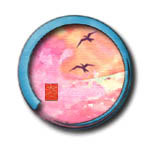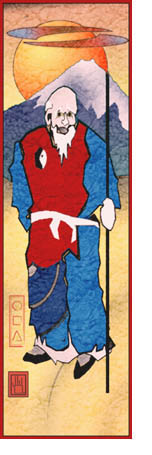On The Way: The Daily Zen Journal
On the Transmission of Mind – Part 3
Huang-po (d. 850)
The Mind is no mind of conceptual thought, and it is completely detached from form. So Buddhas and sentient beings do not differ at all. If you can only rid yourselves of conceptual thought, you will have accomplished everything. But if you students of the Way do not rid yourselves of conceptual thought in a flash, even though you strive for eon after eon, you will never accomplish it.
The building up of good and evil both involve attachment to form. Suppose a warrior, forgetting that he was already wearing his pearl on his forehead, were to seek for it somewhere else? He could travel the whole world without finding it. But if someone who knew what was wrong were to point it out to him, the warrior would immediately realize that the pearl had been there all the time.
So, if you students of the Way are mistaken about your own real Mind, not recognizing that it is the Buddha, you will consequently look for him elsewhere, indulging in various achievements and practices and expecting to attain realization by such graduated practices. But, even after eons of diligent searching, you will not be able to attain to the Way.
Our original Buddha Nature is, in highest truth, devoid of any atom of subjectivity. It is void, omnipresent, silent, pure; it is glorious and mysterious peaceful joy—and that is all. Enter deeply into it by awakening to it yourself. That which is before you is it, in all its fullness, utterly complete. There is naught beside.
Even if you go through all the stages of a Bodhisattva’s progress towards Buddhahood, one by one, when at last, in a single flash, you attain to full realization, you will only be realizing the Buddha Nature which has been with you all the time. All the foregoing stages you will have added nothing to it at all.
This pure Mind, the source of everything, shines forever and on all with the brilliance of its own perfection. But the people of the world who do not awake to it, regard only that which sees, hears, feels and knows as mind. Blinded by their own sight, hearing, feeling, and knowing, they do not perceive the spiritual brilliance of the source-substance.
If they would only eliminate all conceptual thought in a flash, that source-substance would manifest itself like the sun ascending through the void and illuminating the whole universe without hindrance or bounds.
Therefore, if you students of the Way seek to progress through seeing, hearing, feeling, and knowing, when you are deprived of your perceptions, your way to Mind will be cut off, and you will find nowhere to enter.
Only realize that, though real Mind is expressed in these perceptions, it neither forms part of them nor is separate from them. You should not start reasoning from these perceptions, nor allow them to give rise to conceptual thought. Nor should you seek the One Mind apart from them or abandon them in your pursuit of the Dharma. Do not keep them, abandon them, dwell in them, or cling to them. Above, below and around you, all is spontaneously existing, for there is nowhere which is outside the Buddha-Mind.
Students of the Way should be sure that the four elements composing the body do not constitute the self; that the self is not an entity; and that it can be deduced from this that the body is neither self nor entity.
Ordinary people look to their surroundings, while followers of the Way look to Mind, but the true Dharma is to forget them both. The former is easy enough, the latter very difficult.
to their surroundings, while followers of the Way look to Mind, but the true Dharma is to forget them both. The former is easy enough, the latter very difficult.
People are afraid to forget their minds, fearing to fall through the Void with nothing to stay their fall. They do not know that the Void is not really void, but the realm of the real Dharma.
This spiritually enlightening nature is without beginning, as ancient as the Void, subject neither to birth nor to destruction, neither existing nor not existing, neither impure nor pure, neither clamorous nor silent, neither old nor young, occupying no space, having neither inside nor outside, size nor form, color nor sound. It cannot be looked for or sought, comprehended by wisdom or knowledge, explained in words, contacted materially or reached by meritorious achievement.
Huang-po (d. 850)
Excerpted from The Zen Teaching of Huang Po-Trans John Blofeld 1958




We are exhorted to aspire to a paradoxical way of learning/unlearning in Zen; to “think” the unthinkable. Many words are used to help us see the limitations of words, and yet, we keep reading, studying, aspiring to something we inherently possess. There is this sense of trust we have that as we gently proceed “forward” in practice, we will eventually be wet through and through with true understanding like walking through the fog and mist.
So full understanding can come to you only through an inexpressible mystery.
Even to read these pieces written so many hundreds of years ago requires us to leap over time and space and translators’ abilities to accurately represent the heart of the teachings. To read as if listening to the sounds of waves or the cascade of a mountain stream, allowing the words to flow through you rather than stopping to mentally struggle or argue with the teacher, is a key to allowing the writings to work their magic.
We can feel the sincerity of the attempts to communicate something so profound, there really are no words for it. We learn to meditate as has been passed down through many generations. There are many doorways into true understanding; in Buddhism meditation is the grand entryway. And we are told even with enlightenments that come, to discard them and move on, to continue practice.
The true person is
Not anyone in particular;
But, like the deep blue color
Of the limitless sky,
It is everyone, everywhere
In the world.
Dogen
No One Special,
Elana